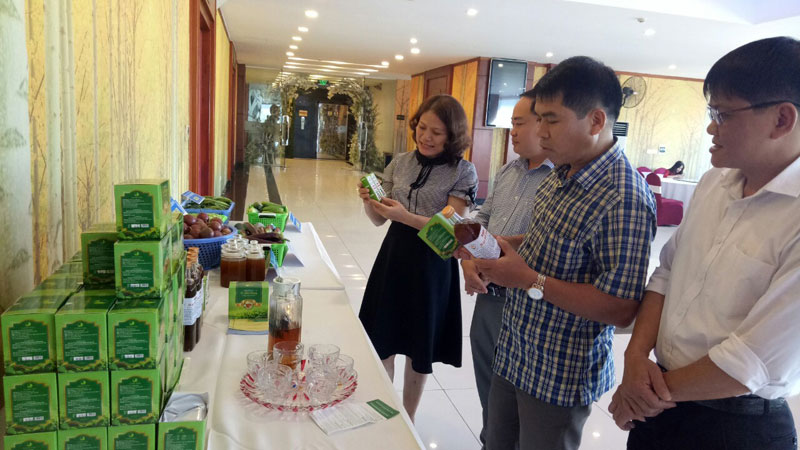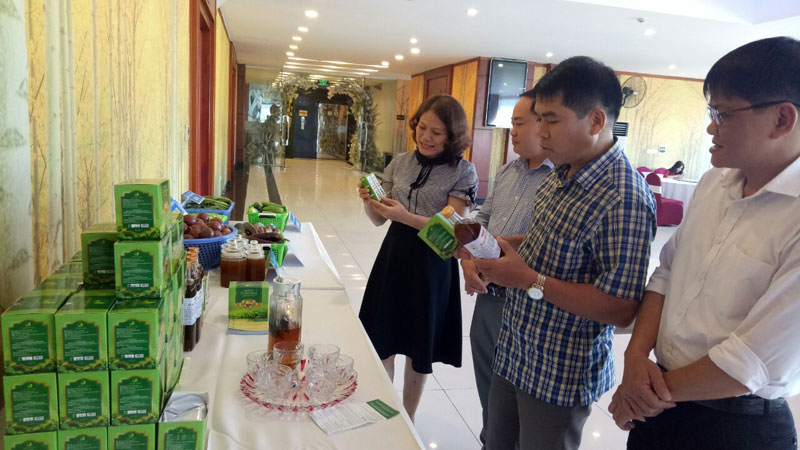
(HBO) - The Hoa Binh provincial People's Committee issued Decision No. 2365/ QD-UBND approving the results of evaluation, grading, and granting certificates of the One Commune Once Product (OCOP) programme at the provincial level in the first phase of 2019 to local products.

A herbal tea product of the Thuong Bi
agricultural service cooperative in Kim Boi district is rated three stars at the provincial level.
There were 30 products of 24 units participating in the provincial OCOP product
evaluation programme in the first phase of 2019, including 22 products in the food
group, five in the beverage group, two in the herbal group, and one in the fabric
and garment group.
Of those, eight products received four-star ranking and 16 others received three-star ranking. The 24 products were
certified by the provincial People’s Committee to use the OCOP label, with the
star ranking printed on packing
as prescribed. The rankings are valid for 36 months from the issuance date of the
decision.
The provincial People’s Committee assigned the Department of Agriculture
and Rural Development to publicise ranked products, and guide the People's
Committees of districts and the Hoa Binh city, and production units to use and
print OCOP label and the star ranking on packing of the ranked products in line
with regulations.
The provincial Department of Agriculture and Rural Development is also
responsible for periodically inspecting products, and proposing measures to handle
violations of product ranking standards and current legal provisions.
Local relevant
departments and sectors were asked to support the People’s Committees of
districts and Hoa Binh city, and production units in taking part in trade
promotion and market seeking activities, towards promoting sales of products meeting the OCOP standard and upgrading
the star level for products of the
province in particular and of the country in general.
Enterprises, cooperatives and production households that have their products
recognised to meet the OCOP standards are responsible for ensuring the quality
of products in line with regulations of the OCOP programme./.
According to data from the Hoa Binh Provincial Party Committee, the industrial production index for the first six months of 2025 is estimated to have increased by 20% compared to the same period last year. This marks the highest year-on-year growth rate for this period since 2020.
In the first six months of 2025, Hoa Binh province’s export turnover was estimated at 1.145 billion USD, marking an 18.11% increase compared to the same period in 2024. Import turnover was estimated at $ 804 million, a 17.15% increase, which helped the province maintain a positive trade balance.
The lives of the ethnic minority farmers in Tan Lac district have gradually improved thanks to the new directions in agricultural production. This is a testament to the collective strength fostered through the professional associations and groups implemented by various levels of the district’s Farmers’ Union.
With the motto the "product quality comes first,” after nearly one year of establishment and operation, Muong village’s Clean Food Agricultural and Commercial Cooperative, located in Cau Hamlet, Hung Son Commune (Kim Boi district), has launched reputable, high-quality agricultural products to the market that are well-received by consumers. The products such as Muong village’s pork sausage, salt-cured chicken, and salt-cured pork hocks have gradually carved out a place in the market and they are on the path to obtaining the OCOP certification.
In the past, the phrase "bumper harvest, rock-bottom prices" was a familiar refrain for Vietnamese farmers engaged in fragmented, small-scale agriculture. But today, a new spirit is emerging across rural areas of Hoa Binh province - one of collaboration, organisation, and collective economic models that provide a stable foundation for production.
Maintaining growing area codes and packing facility codes in accordance with regulations is a mandatory requirement for agricultural products to be eligible for export. Recently, the Department of Agriculture and Environment of Hoa Binh province has intensified technical supervision of designated farming areas and packing facilities to safeguard the "green passport" that enables its products to access international markets.



